ICC and IMF Organized the Global Economic and Financial Situation Seminar
On October 14, the International Monetary Fund (IMF) Resident Representative Office in People’s Republic of China and the International Cooperation Center (ICC) organized a closed-door seminar on the global economic and financial situation in the Hall of Crane at Beijing International Club. The seminar focused on global economic and financial issues in parallel with the 2023 World Bank Group-IMF Annual Meetings and the Fourth G20 Finance Ministers and Central Bank Governors (FMCBG) Meeting. The seminar was chaired by Zhang Zhixiang, member of the ICC Strategic Advisory Committee and former IMF Executive Director for China. Steven Barnett, Senior Resident Representative of IMF in China delivered a keynote speech.

Zhang Zhixiang presides over the seminar.
As Zhang Zhixiang was hosting the meeting, he stated that our world is witnessing the slowing-down global economic recovery, the larger development inequalities, the rising protectionism, as well as serious challenges faced by multilateralism and free trade. The international community expects the IMF to play its crucial role in promoting stable growth of the world economy and international cooperation by upholding economic globalization and free trade, safeguarding stable and unfettered global industrial and supply chains, increasing the representation, voice and influence of emerging market countries and developing countries in international affairs. Against this backdrop, this by-invitation-only seminar focused on how to facilitate bilateral, regional and multilateral cooperation, promote international macroeconomic policy coordination, create an international environment conducive to development with joint efforts and grow new dynamism for global development so as to tackle economic and financial challenges.
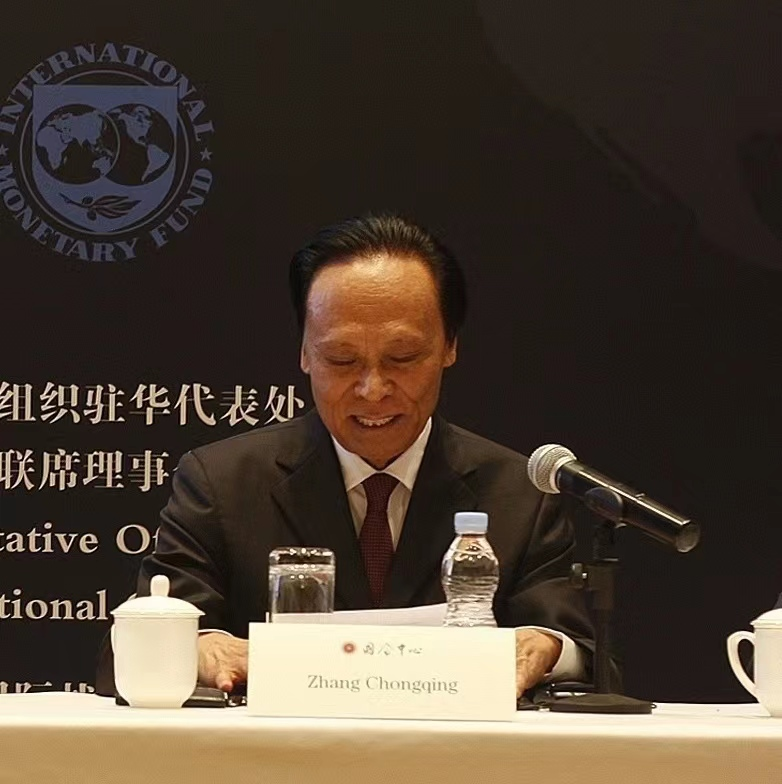
Zhang Chongqing is addressing the seminar.
On behalf of the Strategy Advisory Committee of the ICC, Zhang Chongqing, member of the Strategic Advisory Committee of ICC and honorary chairman of China Group Companies Association (CGCA) delivered a speech titled “Enhancing International Cooperation to Tackle Economic and Financial Challenges”. He noted that on the one hand, under the current global economic and financial circumstance, strengthening macroeconomic policy coordination is the valuable experience for the international community in overcoming the economic crisis, and it is also the consensus of countries around the world. Major economies should intensify macroeconomic and financial policy coordination, improve global economic governance and promote global economic recovery and high-quality development. International and national policies on the reform of global financial regulation are needed in order to promote macroeconomic and financial stability.
On the other hand, countries need to bolster international cooperation. Covering more people, economies and pressing issues in the global agenda and reinforcing multilateral cooperation can stand as an efficacious solution for addressing global challenges. Countries should focus on the urgent needs of developing nations and pursue practical cooperation in key areas such as poverty reduction, food security, and industrialization so as to address the imbalances and inadequacies in development. By doing so, the international community will make steady progress towards a comprehensive, balanced, and sustainable recovery of the world economy. In addition, the IMF and other international economic and financial institutions can play a more constructive role in building international consensus and preventing systemic risks, injecting new impetus into global economic recovery and sustainable development.
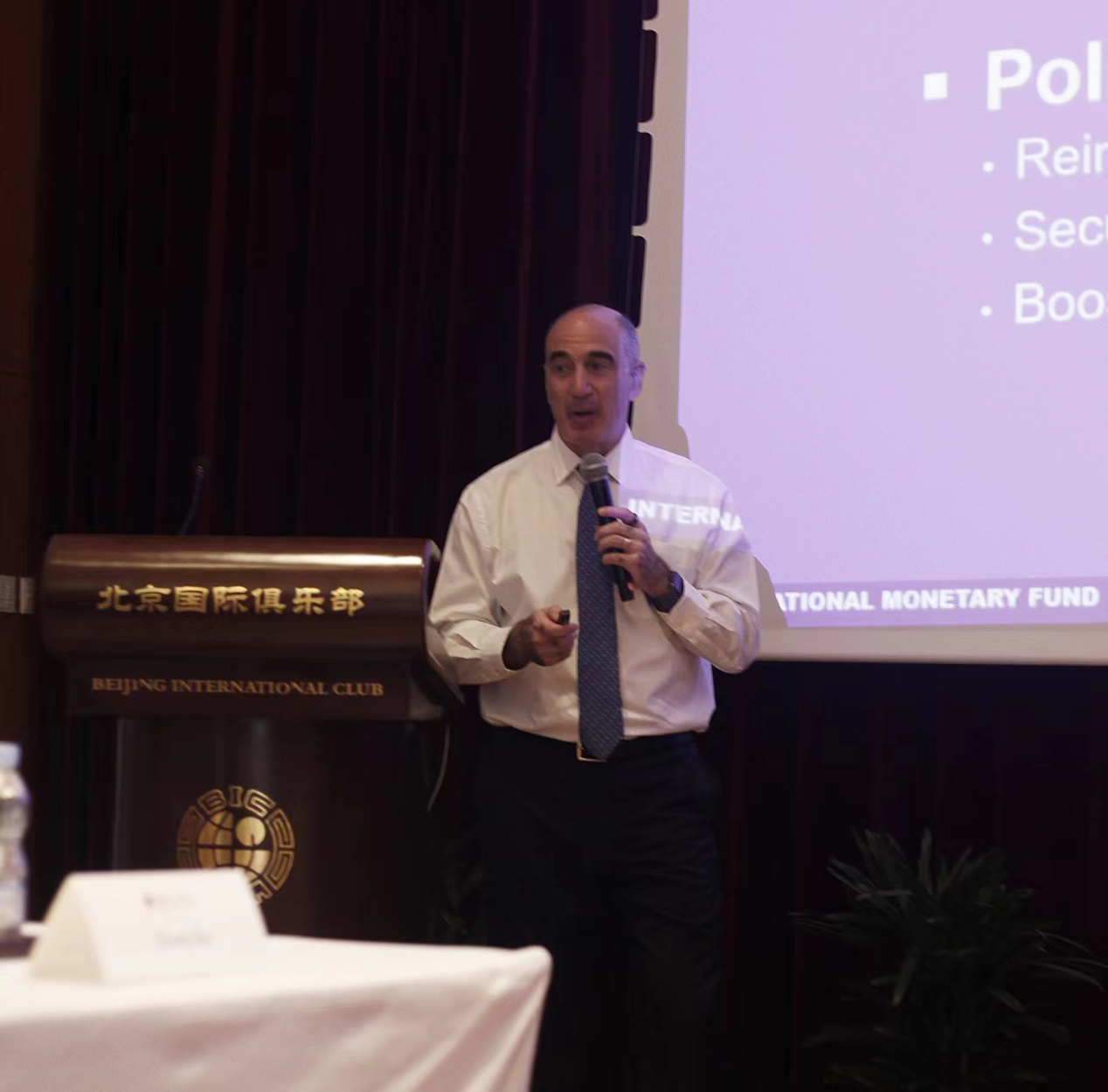
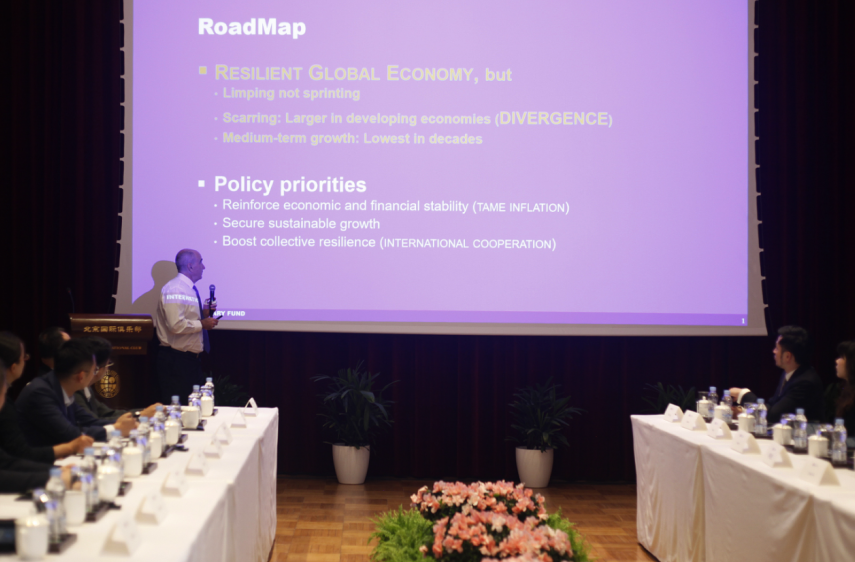
Steven Barnett is delivering the lecture.
On the seminar, Steven Barnett delivered an insightful lecture titled “Navigating Global Divergences”. He pointed out that the global economy is in the phase of recovery but in a limping and uneven manner. The world economy exhibits resilience in 2023 but also faces the pervasive “scarring effects” due to the COVID-19 pandemic. According to the latest projection of the IMF, global economic growth will decelerate from the 3.5% in 2022 to 3% this year and 2.9% in 2024. However, China remains the largest driving force for global economy, contributing to one third of the total growth. Typically, low-income countries will have a hard time confronting the economic consequences, leading to numerous short-term challenges and repercussions. At the same time, our medium-term growth projection hits the lowest in decades. To tackle the challenges in global economy and finance, the international community needs to draw upon the WTO dispute settlement system, strengthen coordination and collaboration on monetary and fiscal policies as well as structural reforms, and foster cooperation among nations and regions worldwide with the spirit of international cooperation.
Speeches were delivered by special guests respectively, including Jang Ping Thia, Lead Economist and Manager of Economics Department, Asian Infrastructure Investment Bank (AIIB), Zhou Suli, Minister-Counselor of Mission and Deputy Chief of the Singapore Embassy, Tadaaki Kawamura, Minister Financial Attache of Japanese Embassy in Beijing, Ma Jian, Former Deputy Representative of the United Nations Industrial Development Organization (UNIDO) for China, Scott Sumner, Hawtrey Chair Emeritus of Monetary Policy at the Mercatus Center at George Mason University, Christopher Perks, Counselor (Treasury) at Australian Embassy, Beijing, Dongjoo Shin, Representative of the Bank of Korea in Beijing, and Tian Hui, Director of the Strategic Development Department of State Development and Investment Corporation.
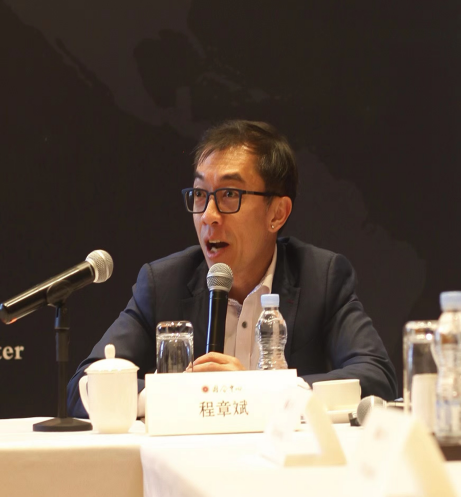
Dialogue between Jang Ping Thia and Steven Barnett
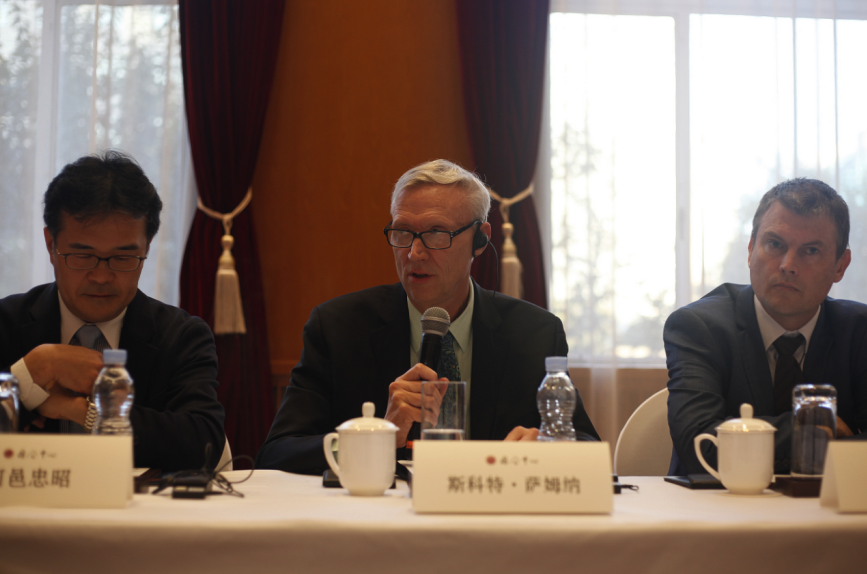
Special guests delivered speeches by topics.
It was recognized that the global economic outlook is still affected by multiple interconnected and structural risks. In the face of many global challenges, the future of the world economy is a matter of great concern to all. Past economic and financial crises have taught us plenty of lessons. From the perspectives of changes in geopolitics, debt crisis, technological trends and demographic structure, participants made predictions on the medium- and long-term global economic and financial situation. Discussions have been held on topics including “Global Economic and Financial Situation and Prospects for Development”, “Recovery and Challenges in International Economy and Finance” and “Suggestions for Strengthening the Macro Policy Coordination and International Cooperation”, yielding fruitful outcomes.
The seminar was attended by leaders, experts, scholars and guests from home and abroad from the Development Committee, the International Strategy Research Center and the Overseas Interests Protection Center of the ICC, including Zhang Yu, Deputy Director of the Steering Committee of the ICC, Liao Ying, Deputy Director of the International Education Office and Director of the Center for Global Competence Development at Tsinghua University, Zhang Bin, Vice President of the Committee of Foreign Exchange Affairs of China Group Companies Association (CGCA),Cheng Yu, Executive Secretary General of the ICC, Huang Cheng, Deputy Director of the Center for Global Competence Development at Tsinghua University, Xin Shaosong, Executive Deputy Director of the ICC’s Office, Li Wenpeng and Li Yi, members of the Foreign Exchange Committee of the ICC, Lin Xianjin, Head of the Office of the China National Light Industry Development and Research Center, and Lu Qian, Associate Professor of the School of Economics, Central University of Finance and Economics.

